#Teshuva
Explore tagged Tumblr posts
Text
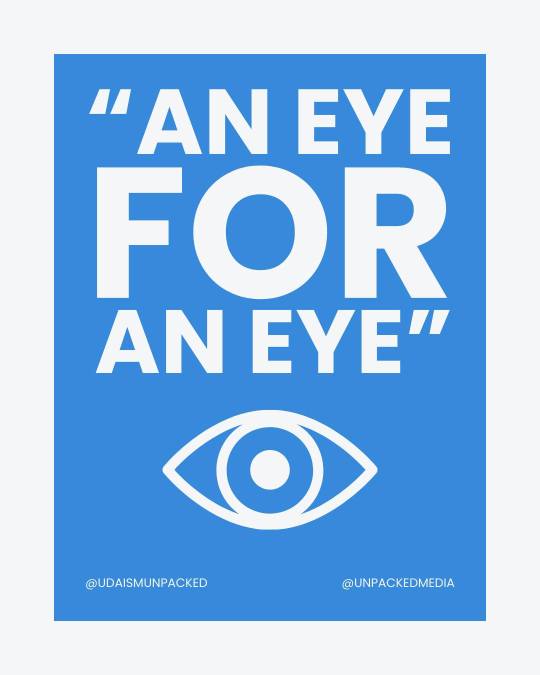
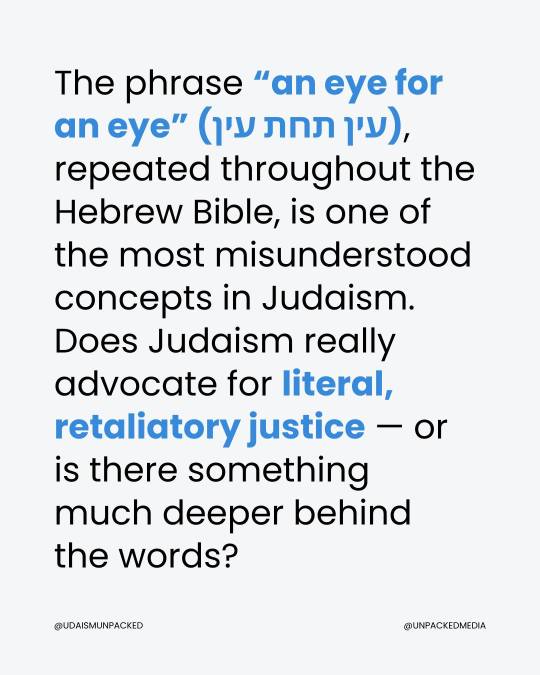

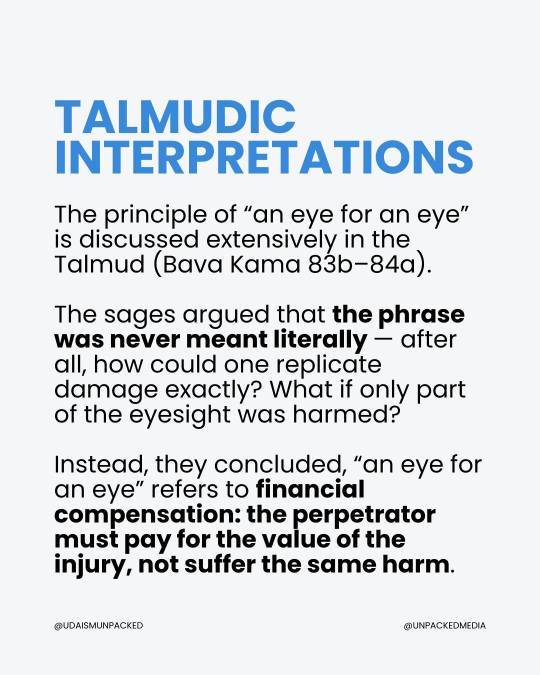


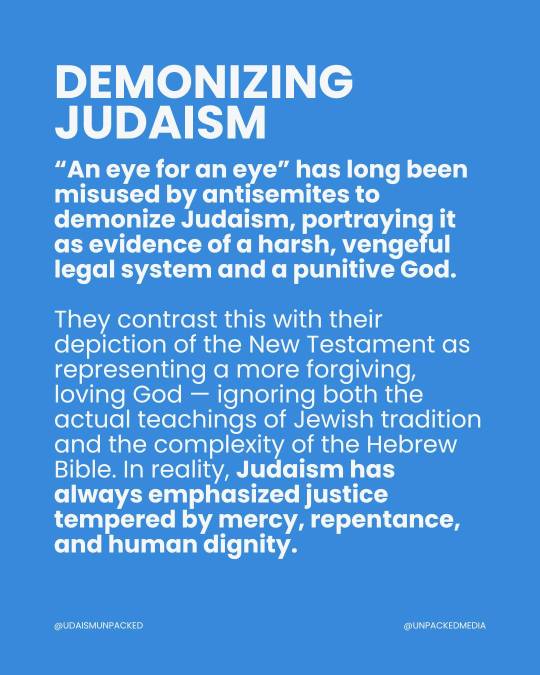
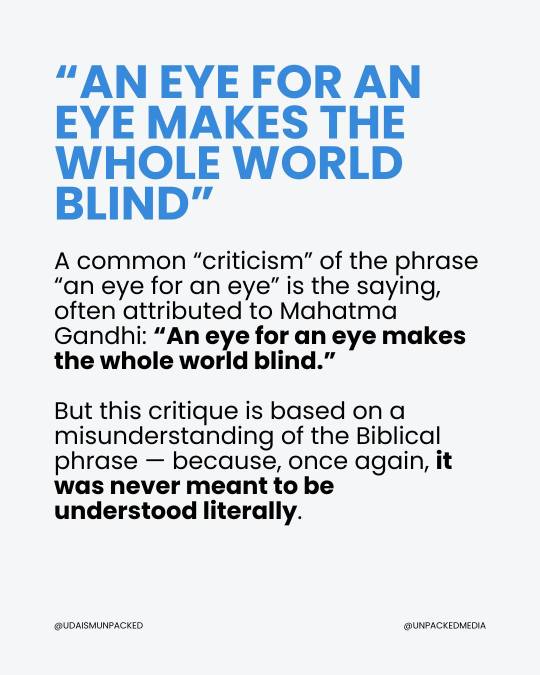


“An eye for an eye” (עין תחת עין) is one of the most misunderstood phrases in the Torah. Judaism never took it literally. The Talmud (Bava Kama 83b–84a) makes clear: it’s about financial compensation, not physical retaliation.
Maimonides explained that the dramatic language emphasizes the severity of the harm; the perpetrator must recognize the gravity of their actions and do teshuva (repentance). Justice in Judaism is about accountability, not vengeance. It's about repairing harm with dignity, not perpetuating pain.
Unpacked Media
#JewishWisdom#TorahTruth#JewishJustice#EyeForAnEye#Teshuva#Talmud#MisunderstoodJudaism#JewishLearning#JewishValues#UnpackedJudaism
241 notes
·
View notes
Text
BS”D
The Two Children
A parent has two children. One of whom is responsible, humble, and desires connection with their parent, and one of whom is egotistical, irresponsible, and primarily pursues their own benefit and enjoyment. Early in their childhood, the parent gives both children the same responsibilities. Easy, simple chores that they expect both children to do, and if they don’t, there will be no major loss. The responsible child does their chores with respect, knowing that whether or not they enjoy their chores, they look forward to the time they’ll be able to spend with their parent after they are finished. The irresponsible child rarely does their chores, instead choosing to lounge around, draw on the walls in crayon, complain, and roll their eyes at anything their parent asks.
As they get older, the parent recognizes that they can trust the responsible child with more meaningful tasks, and that they can rely on them to be completed. In return, the responsible child acquires a deeper relationship, and cultivates their emotional connection with their parent. The irresponsible child continues to receive basic tasks, and continues to present emotional resistance to their parent, refusing to do the simple tasks, respecting only themselves and even going directly against their parents’ wishes, doing things that present danger to themselves, and maybe even the entire family.
When they are teenagers, the responsible child is trusted to stay out late, to come home when expected. The parent trusts them to start to take some responsibilities in organizing and planning in the household, and they get a job. The irresponsible child continues to misbehave, perhaps joining a gang, or getting into drugs. They still refuse to contribute to the household via any basic tasks, and occasionally even try to work against the responsible child in their own actions.
When they are full-grown adults, the contrast is stark. The responsible child has developed a deep and meaningful dialogue with the parent, and has a reciprocal relationship, where they provide the parent with some of the support they once received as a child. They have learned to do things for the parent on their own initiative… not because they are told what to do, but because they’ve developed a feeling for what makes their parent happy. The irresponsible child has finally noticed that their own actions have shredded their relationship with their parent, leaving them estranged. Rather than reflecting on how they should behave in the future and trying to repair the bridges they burned, they begin to resent and even hate the responsible child for their rich, intimate, and personal relationship with the Parent, a relationship cultivated…. Over thousands of years.
Such is the relationship between Hashem, Jews… and antisemites. In the days of Noah, G-d gave all of humanity 7 commandments; Not to murder, not to steal, not to commit acts of sexual immorality, not to blaspheme His name, to believe in Him, to establish courts of law, and not to eat meat taken from a live animal (Rambam, Hilchos Malachim). By and large, the nations of the world paid little heed to these laws, and invented new forms of idolatry, undermining any relationship they had with the Master of the World. When they did keep the laws, they often did so with complaint, or with perversion and malice. For instance, the “courts of law” of the city of Sodom were used to accuse, try, and execute those who hosted guests or gave charity….
… And then there was Avraham and his family. They kept the 7 Noahide Laws with awe and respect, and cultivated a relationship with G-d. G-d gave Avraham tasks, tests to his dedication and he passed them all. In response, he was given a new mitzvah. As the Lubavitcher Rebbe says in the final Ma’amer he left us with, the term mitzvah (מצוה ־ commandment) is related to the term tzavsa (צװתא) meaning “connection”. This mitzvah - the mitzvah of milah - represented the first vote of confidence between him and his Father in Heaven, “I understand, you want to connect to me, and I know you want to do more, but let’s start with this. This isn’t a one-off, this is the first step between you and I.” As the years, decades, and centuries passed Avraham’s children deepened their relationship with Hakadosh Baruch Hu (The Holy One Blessed be He), and he took care of them intimately, as with Yitzchak during the famine. When Yaakov dedicated himself to raising a people who would all follow G-d’s word, he was even given a name which showed his relationship with G-d… a name which foreshadowed an even deeper relationship in the future - one where his hundreds of thousands of descendents receive a Torah containing a spiritual letter for each and every one of them, as it says in the Zohar Hakodesh - that Yisrael stands for “There are 600,000 letters in the Torah” (י־ש ש־ישים ר־יבוי א־ותיות ל־תורה). After the people’s teenage years - 210 years of suffering in Egypt (Who’s to say that Hashem doesn’t understand the suffering of a teenager!), they were ready to deepen their relationship again.
Hashem was ready to give them the responsibilities associated with the upkeep of the house. Hashem was ready to begin the partnership that was prepared for from the 6 days of creation, as it says “אשר ברא אלקים לעשות” “Which Hashem created ‘to do’.” It states in Bereishis Rabbah (11:6) - “Everything that was created in the 6 days of creation requires further work”. While the simple understanding of this Midrash is the idea that wheat needs to be ground to make bread, or that mustard must be sweetened before it is eaten, a much deeper explanation is brought in sifrei kabbalah and sifrei chassidus: The Mitzvos that Hashem has commanded us help to spiritually complete the creation he left uncompleted.
As we matured as a people, we came to understand what Hashem wanted of us, and enacted our own decrees, including Rabbinic Mitzvos and fences or additional obligations in addition to the scriptural ones, as it says in the Talmud (Berachos 20b):
דרש רב עוירא, זמנין אמר לה משמיה דרבי אמי וזמנין אמר לה משמיה דרבי אסי: אמרו מלאכי השרת לפני הקדוש ברוך הוא: רבונו של עולם, כתוב בתורתך ״אשר לא ישא פנים ולא יקח שחד״, והלא אתה נושא פנים לישראל, דכתיב: ״ישא ה׳ פניו אליך״?! אמר להם: וכי לא אשא פנים לישראל, שכתבתי להם בתורה ״ואכלת ושבעת וברכת את ה׳ אלהיך״, והם מדקדקים [על] עצמם עד כזית ועד כביצה.
”Rav Avira taught, sometimes in the name of Rebbi Ami, and sometimes in the name of Rebbi Asi: The ministering angels said before the Holy One, Blessed be He: Master of the Universe, in Your Torah it is written: ”who favors no one and takes no bribe” (Devarim 10:17), yet You, show favor to Israel, as it is written: “The Lord shall show favor to you…” etc (Bamidbar 6:26).
He replied to them: And how can I not show favor to Israel, as I wrote for them in the Torah: “And you shall eat and be satisfied, and bless the Lord your God” (Devarim 8:10), yet they are exacting with themselves [to recite birkas hamazon] on [bread] the size of an olive or an egg.
The irresponsible child began to truly notice his lack of relationship with his Father in Heaven when the Torah was given, and began to resent the Jewish People even then, as it says in Tractate Shabbos in the Talmud (89a);
“מאי ״הר סיני״? הר שירדה שנאה לאמות העולם עליו.
”What is the meaning of ‘Mount Sinai’? The mountain which drew hate (sina) from among the nations”.
As time went on his hate turned to anger, and anger to rage. He did not look inward to see why he wasn’t being given more responsibilities. He didn’t examine his own behavior to realize that the true cause of his resentment was the guilt of a missed opportunity - or many of them. Instead, the rage of the Irresponsible child has manifested in every generation, causing violent actions towards individual jews and genocide attempts against the entire Jewish people. With the entire history of the world as precedent, his behavior in our generation is neither unusual nor surprising.
Next time you see an antisemite spouting vicious vitriol - or if you are an antisemite and you’re feeling angry while reading this, remember that those feelings are nothing more than the invalid insecurities of a petulant child who squandered every chance to form a meaningful relationship with his Father, and instead of reflecting on his own shortcomings, he has chosen to blame his sibling for all of his problems.
The solution in my eyes is twofold: Antisemites must recognize where those feelings come from. Blaming a people that makes up 0.2% of the world’s population for 99.8% of the world’s problems is neither logical nor realistic. Learn about us. Get invited to a shabbos meal, or a passover seder. Trust me, you WILL find a jew (for better or worse) who will invite you. You’ll be well fed, and it won’t be poisoned. Don’t just take my word for it either: Educate yourself about Judaism from Jewish websites, like Chabad.org or Aish, not from Wikipedia - and certainly not from random users on Tumblr or Facebook.
Us as Jews? We must recognize the source of these things, and not be discouraged. We should stay the course. We’ve been developing our relationship with Hashem for thousands of years, and we’ve been tasked with fixing his broken world. If someone who was formerly an antisemite - or someone who is trying to change - approaches you, remember to stay safe (do your due diligence to ensure your own safety before inviting them over!), but be welcoming and warm to the best of your abilities. Ultimately… even the estranged, petulant, irresponsible child is still a child of Hashem, and regardless of your personal feelings (and mine, by the way), can be accepted in repentance, should Hashem desire it.
9 notes
·
View notes
Text
how to end all-tyranny
the power of love❤️😔
the power of incredible violence💔😩
the power of the Word🤍👑
#christian#christianity#catholic#catholicism#hebrew catholicism#hebrew catholic#hebrew universalism#universalism#ecumenism#islamic humanism#tikkun olam#humanism#interfaith#secular humanism#the world will be healed in us#by He who made it#one world one humanity#radical hope#kindness#chesed#birr#teshuva
6 notes
·
View notes
Text
On Community Teshuva
This Elul, I would love to see Jewish spaces acknowledge that they have ostracized disabled and chronically ill community members. Teshuva is a vulnerable, often times painful reminder that we do fall short in areas of our lives. No one enjoys being in the wrong, no one wants to admit their actions had consequences that harmed vulnerable people, no one wants to hear that their beliefs are based in bigotry. Yet that’s what teshuva will require of those who want to be better allies to disabled community members.
It begins with a genuine understanding that regardless of how you see yourself, your actions and inactions have directly impacted disabled people around you. It’s acknowledging that accessibility can look completely different from what you expected, and to question biases and frustrations that may come up. It’s holding yourself and those around you accountable for addressing needs, even when you hit roadblocks and want to quit. It’s doing this tzedakah because you know it means the difference between disabled Jews being present and being left behind.
What can Synagogues and organizations do to create community teshuva?
Hold monthly meetings to discuss updates on accessibility and new access needs.
Read books and articles by Disability Justice leaders.
Have periods of time where Tzedakah go towards meeting access needs.
Check-ins on disabled community members who are isolating.
What else do you think Jewish organizations need to do to work on ever present ableism?
#disability justice#judaism#disability rights#jewish holidays#accessibility#chronic illness#disability#text post#tzedakah#teshuva#high holidays#disabled jews
39 notes
·
View notes
Text
RECTA FINAL 154 YAHSHUA LE QUITO AUTORIDAD AL SANHEDRIN por el Roeh Dr Javier Palacios Celorio
🔴Cuando una persona comienza en el estudio de la Torah, muchas veces se encuentra con fuentes y estudios del judaísmo que no es precisamente Torah ya que durante muchos años han mezclado la Torah con cábala y mandamientos de hombres , por eso es importante entender que Yahshua Ha Mashíaj quito la autoridad al sanhedrin ¿Sobre quien recae la autoridad sobre el pueblo? ¡Comparte esta importante información!
2 notes
·
View notes
Text
A Yom Kippur thread on teshuva, repentance, and apologies.
I wrote this awhile ago on twitter, and it’s still very relevant:
So. Teshuvah. Repentance. Literally "returning"
What does this mean? What does it look like? And why am I talking about this on main, not just to my fellow Jews?
There's been a lot of conversation about apologies and about taking accountability for hurting people/making mistakes. This has been especially prevalent in streaming spaces lately (when I wrote this last year), both with creators and game companies/developers.
This means I've been thinking a lot about all of this, as we go into the holiest day of the Jewish calendar, focused on exactly this.
So what does it mean to repent? Why is the word for it "return"? And why do I feel this template is so important?
So to start with, Teshuvah has three main steps:
1) Regret
2) Confession
3) Committing to not repeating the sin
Note: sin in Judaism is complicated, but is not really the same as sin in Christianity.
Short form on sin in Judaism is three terms:
Chet = mistake
Avaira = Transgression, crossing a line, going too far
Avon = Iniquity, more serious than a mistake or line cross, but still not a "you are damned to hell" type of thing
So lets look at the steps to Teshuvah, one by one.
1) Regret
To do Teshuva you need to regret the actions you did and harm you have done. This means understanding what you did, and actively genuinely accepting the fact that you did something wrong.
2) Confession
This means a few things. You need to be able to articulate what you did wrong. Part of this is the apology. I'll get to a good apology later, but a core piece is that you are apologizing with accountability, and that the person you hurt may not forgive you.
Importantly, you can not be apologizing in order to get forgiveness. And your teshuvah must continue whether or not the person forgives you.
3) Committing to not repeating the sin.
This is extremely important, and really the key part of teshuvah, of returning. It is not teshuvah to make the mistake, go through steps 1 and 2, and then repeat the same mistake. This means active work.
Step 3 requires true understanding of what you did (also key to steps 1 and 2) and figuring out how to keep from repeating it. Depending on what it was, it may mean self reflection, reading, talking with people, watching relevant videos, etc. But again, the key part is that work and doing your utmost to grow and move on and not repeat it.
Which can be hard! Teshuvah can be hard!
All of this requires being willing to listen and hear and change.
To me, this is all really important, & a big piece of how I try to live my life. It's also what I look for in others.
We're human, we make mistakes. How you deal with those mistakes is so key. When we're here, in this public space, especially if we have any level of platform. We have to be ready to accept it when we fuck up.
I truly believe the steps of teshuvah are the steps needed. I also believe that these are the pieces of a proper apology.
An apology in this light:
Here's what I did wrong, here's me taking accountability and accepting I hurt people, here's how I commit to fixing my mistake/not making that mistake again.
Again, it also must be an apology because you are acknowledging wrong, not because you are feeling pressed into it, not to get people off your back, not to appease. It must be made with the awareness you may not be forgiven, and committing to continue the work no matter what.
There's another key part to Yom Kippur that I think is little known but I think is important. Which is acknowledgement of communal mistakes. Over Yom Kippur we have a lot of confessions, and a lot takes the form of "WE have done A, WE have done B.” This is an important conversation and I plan to write a post on this later, but I also think that it's part of what should be on our minds. I think it aligns with understanding privilege and societal complicity.
So, that's all for now, But I have more Yom Kippur thoughts coming.
8 notes
·
View notes
Text
Excellent article by Zvi Freeman on how not to do teshuva. Pull quotes:
There's sin, there's evil, there's hell, and then there's depression. At least hell gets you somewhere.
Worse yet: You might take this life-review to heart. Then you'll say, “Boy, was I rotten! Boy, was I nasty! I guess I'm just a real rotten, nasty guy and always will be”
2 notes
·
View notes
Text
¡¡¡¡INFORMACIÓN MUY IMPORTANTE!!!!
""¡¡VEA ÉSTE VIDEO Y COMPARTE,QUE SERÁ DE BENDICIÓN!!""
🔴Shalom132: RECTA FINAL 116 ¡INFORMACION IMPORTANTE! GRAN FIESTA DE ROS...
¡¡¡¡INFORMACIÓN IMPORTANTE!!!!
________________________________________
""¡¡VEA ÉSTE VIDEO Y COMPARTE,QUE SERÁ DE BENDICIÓN!!""
¡LA ÚNICA SOLUCIÓN PARA TUS PROBLEMAS ESTÁ EN EL CANAL YOUTUBE SHALOM132,PORQUE ESTÁ BASADO EN LA PALABRA DEL TODOPODEROSO, ¡LA ÚNICA VERDAD!
"Juan 8:32"
¡"[32]y conoceréis la verdad, y la verdad os hará libres."!
¡VISÍTA EL ¡CANAL YOUTUBE🔴
SHALOM132
PÁGINA📄 WWW.GOZOYPAZ.MX
RADIO📻
SIMJATORAH.ORG
ENCONTRARÁS LA SOLUCIÓN PARA TODOS TUS PROBLEMAS.
PORQUE ESTÁ BASADO EN LA PALABRA DEL TODOPODEROSO, ¡LA ÚNICA VERDAD!
#torah #palabrasbonitas #amor #bibliasagrada #biblia #salmos #realidad #tehilim #voluntaddedios #verdad #ultimostiempos #Shalom132 #Shalom #Israel #Escrituras #escriturassagradas #escriturasagrada
#@shalom132#shalom132#@torah#biblia#@verdad#torah#youtube#kehila joy and peace#the torah#arrepentimiento#teshuva#israel
0 notes
Text
Rabbi Dayna Ruttenberg, author of "On Repair and Repentance" announced the news that she's going to share a conversation with legendary Neil Gaiman in October.
Back during the high holiday season in 2015, one of our Jewish writers wrote, "An apology is where it has to begin," on the very same topic where she quotes Gaiman's writing on the topic.
Inspired by Rabbi Ruttenberg's news and the high holiday season, we're sharing that article once again.
#Jewish#Judaism#apology#Neil Gaiman#Rabbi Dayna Ruttenberg#On Repair and Repentance#repentence#teshuva#Yom Kippur#rosh hashanah
1 note
·
View note
Text






[PALABRA DEL TODOPODEROSO]
[El PODEROSO HACERDOR DE]
[MILAGROS Y MARAVILLAS]
[¡NUESTRO CREADOR!]
[YAHWEH TZVAOT(DE LOS EJÉRCITOS)]
Te recomiendo un Canal para estudiar la Biblia
"Totalmente Gratis" sin costo alguno,se llama
El canal Youtube: "Shalom132".
#shalom132#simjatorah#torah#youtube#israel#bible#palabra de dios#alegria#felicidad#messianicos#messianic#teshuva#arrepentimiento#simja
2 notes
·
View notes
Text
Just to think that in Judaism, admitting being in the wrong is the first and decisive step to personal redemption.....
Internet mobs will be like "why doesnt anyone just ADMIT when theyre WRONG anymore??!!" and then treat someone like they deserve the death penalty because they said something off-colour on twitter when they were 14
No one will admit that they were wrong if you treat being wrong like its an eternal indictment against them with no chance for rehabilitation
79K notes
·
View notes
Text
A fun fact about me is that I can trace my family lineage (on my mother’s side) back to Rashi, and according to rabbinic tradition, Rashi could trace his lineage to King David. While this means I’m ineligible for the kingship of Israel (on account of being a descendant through my mother), I do however believe it gives me license to continue naming the gay fanfiction I write after King David’s poetry.
And you know what? I think Great Grandpa King David (was famously in love with his childhood best friend Jonathan) would be proud of me 🫡
#got that Baal teshuva rizz#when even writing gay fanfiction becomes an exercise in Jewish liturgical tradition#another fun fact is that I’m a Levite on my father’s side which is pretty cool#and also says something about how even Ashkenazi Jews can often trace their lineages directly back to the land of Israel#but we don’t need to get into that on a silly post about fanfiction#jewish#jumblr
138 notes
·
View notes
Text
It's so infuriating to have to grovel and beg for time off when my school schedules tests on the High Holy Days, when the onus should be on them to not fucking do this in the first place. They have a page on their website that lists major holidays of world religions, Judaism included, and yet they never seem to look at it.
#samara speaks#jumblr#antisemitism#sorry this isn't very elul teshuva core of me but it's really upsetting
250 notes
·
View notes
Text
Wild and revolutionary concept: maybe don't treat converts like trash just because they're converts? And also don't ask someone if they're a convert in a public setting?
#having lunch before shabbat and had to remind my friend not to do this to people#like i get it might be a hard concept for some born jews to understand but one thing jumblr has taught me#is that its a sensitive and private topic#you dont just.bring it up. especially not in front of people?#because i have seen other born jews get all Different when they find out someone is a convert#and its crazy disrespectful#side note you can disagree w a convert about their opinions on certain things#and still not go after them for being a convert#thats a dif topic though#anyway unless the convert is openly inviting that convo#dont fucking bring it up????#jumblr#judaism#jewish#jewish conversion#like it prob feels like how i do when someone treats me dif for being baal teshuva#its just a shitty thing to do in general#dont bring it up?#if you have to ask they prob havent told you for a reason#yes even if its from a movement you don't think is vaid#like what do you expect them to go back to their rabbi and be like 'is like to return this conversion and exchange it for orthodoxy'#thats not how it works they already converted to that movement what is the point of you trying to make them feel bad about it#like what do you change or affect by doing that#same w being baal teshuva#you want me to get in a time machine and tell my parents to move to a jewish community?#whats the point of saying anything just shut up
743 notes
·
View notes
Text
Also this black and white thinking is so dangerous. That people are good or bad and thats all there is to it.
Can I introduce you to the concept of teshuva. Teshuva means someone did something bad, and then they regret doing bad, and then they go through a process of growth and seeking forgiveness - which is not obligated to be granted - and teshuva is complete when a person has the exact same opportunity again and chooses differently. They have become a different person who will no longer cause the same harm that they once did.
Justice is important. Safety for victims and survivors is of utmost importance. That doesnt mean someone fucks up so we get to murder them.
A life is an entire world, is priceless. We dont decide when a life ends. The only exception is when your life is on the line, because your own life is your top priority, over someone else's life. You never have to risk death to save someone else. But otherwise, you do everything you can to preserve life, even for a murderer a pedophile some guy you just really hate. Maybe they'll do teshuvah. Maybe they'll change. They certainly wont if theyre dead. We'll never find out what good they were capable of.
This is also true of ostracising someone from your community because they said something a little Problematic and you didnt give them the time of day to understand their perspective or consider if maybe youre the one who's mistaken. (If its a random, fine, block them. If its a friend, talk about it. Certainly dont harass strangers.)
Dont you want breathing room? Space to grow and learn and do better? Because not a single one of us is perfect and never makes a single mistake or hurts anyone, and has all the right opinions all the time. Being human is being riddled with flaws and doing our best to knit ourselves into something better.
And yes theres scale, stealing a pen isnt the same as murder. As a general rule though, black and white, good and bad, death penalty for bad people and life for good people, that doesnt leave room for us to be humans who make mistakes and learn and grow and need each other. It just makes everyone full of 'righteous' anger and terrified to step out of line, what line and who drew it, who knows? What gave them the right, I sure dont know.
Some of you are literally watching the right wing continuously try to expand the definition of "pedophilia" to include "existing around a child while queer," and then agreeing with them when they say pedophiles deserve to be summarily executed.
Not only does this place innocent people in danger of political executions, it also puts children in danger, as most children who are sexually abused have this done by someone close to them, and feelings that they would be responsible for the death of their abuser if they reported leads to lower rates of reporting. It also leads to higher rates of abusers murdering their victims when they're found out because the punishment will be the same anyway.
Part of being on the left is realizing that it's better to let 100 guilty men go free than to wrongly convict one. Another part of being on the left is realizing that one's life is never something others have the right to take away- even the most evil people alive. Yes, that includes mass murderers and rapists and pedophiles. Once you make one group acceptable to kill, you give others a vested interest in defining groups they have prejudice against into that group.
You have to start dealing with the fact that no crime makes one's life forfeit. Not even the worst most depraved and sadistic acts. The worst people alive have rights, and if you can't accept that they deserve them, at least try to accept that it is to your benefit that they retain rights no matter what they're accused of. And if you can't do even that, well... you just might be the kind of person who would cut off your nose to spite your face.
If you want to protect victims, if you want to protect minority groups, you have to realize that sex crimes, or any crimes at all, do not deserve the death penalty. Period.
#we also just dont get to decide life or death. who can possibly be trusted to make that decision and what gives them the right#which is a more philosophical argument than 'allowing any death penalty allows for the definition of whos deserving of it to be expanded by#whoever has power'#comment#teshuva#justice
13K notes
·
View notes
Text
"APRENDE TORAH"(LA BIBLIA) CON ESTE VIDEO.ES UN TEMA IMPARTIDO POR EL ROEH LUIS CERVANTES. ¡BASADO A LA PALABRA DE DIOS TODOPODEROSO, LA ÚNICA VERDAD!
ES UN VIDEO QUE LE AYUDARÁ SEGURO PARA USTED Y A LOS SUYOS.
¡¡NO TE LO PIERDAS!!
TAMBIÉN ESTÁ ESTOS SITIOS QUE USTED PUEDE VISITAR,PARA QUE USTED ENCUENTRE LA "VERDAD" Y LA VERDAD LE HAGA LIBRE.
EL CANAL YOUTUBE🔴:
SHALOM132
LA PÁGINA WEB📄:
WWW.GOZOYPAZ.MX
LA RADIO📻:
SIMJATORAH.ORG
¡"VISÍTELO NO SE LO PIERDA, MUCHAS BENDICIONES"!
CUALQUIER PREGUNTA, DUDA O OTRA COSA PÓNGASE EN CONTACTO CON ESTOS NÚMEROS DE TELÉFONO POR"WHATSAPP":
# +521 238 10 711 54
# +521 238 10 720 57
De Domingo a Jueves de 9am a 8pm hora central de México.
🔴PARASHÁ SEMANAL BERESHIT - EN EL PRINCIPIO ¡Entreguemos el shabat estud...
#torah #palabrasbonitas #amor #bibliasagrada #biblia #salmos #realidad #tehilim #voluntaddedios #verdad #ultimostiempos #Shalom #Kehilagozoypaz #Shalom132 #Israel #teshuva #sagradasescrituras #PalabrasVerdaderas #DiosEsAmor #arrepentimiento
#@shalom132#shalom132#@torah#biblia#@verdad#torah#youtube#kehila joy and peace#the torah#arrepentimiento#israel#teshuva
1 note
·
View note